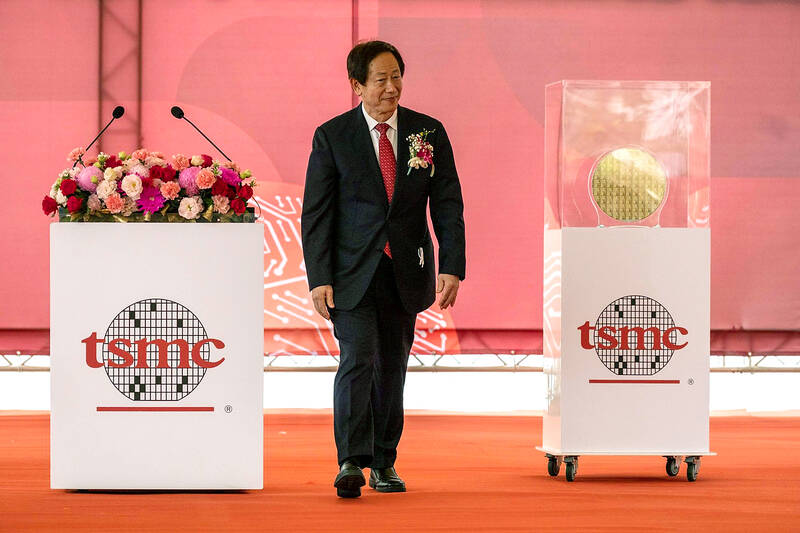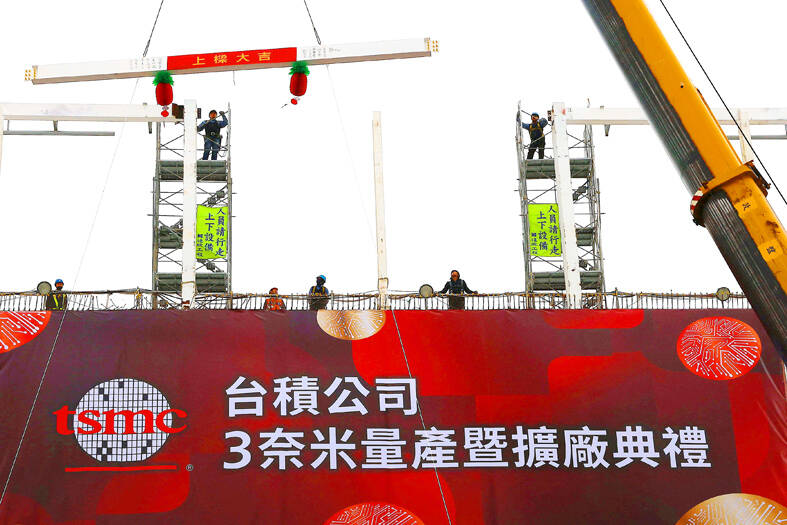Taiwan Semiconductor Manufacturing Co (TSMC, 台積電) yesterday raised its investment on an advanced Tainan factory to a total of NT$1.86 trillion (US$60.5 billion) to boost advanced technologies capacity including 3-nanometer, after its plans to produce chips in the US triggered concerns at home over technology outflow and talent drain.
That represented a significant increase from the NT$700 billion the chipmaker announced in 2018 on the Tainan “giga-fab," dubbed Fab 18, to produce 5-nanometer chips, and establish a research and development (R&D) team. The company at the time said that it would reserve half of the facility’s space for the production of 3-nanometer chips.
TSMC, the world's biggest contract chipmaker, yesterday launched the eighth phase of construction at Fab 18 to mass produce 3-nanometer chips, the most advanced chips available.

Photo: Reuters
TSMC began making 5-nanometer chips at the fab in 2020 and the commencement of 3-nanometer chip production follows Moore’s Law, which postulates that the number of transistors on computer chips would double every two years, it said.
“Powered by the megatrends of 5G and high-performance computing, TSMC’s 3-nanometer technology is experiencing strong market demand,” TSMC chairman Mark Liu (劉德音) told a ceremony in Tainan marking the beginning of mass production of 3-nanometer chips and capacity expansion.
The moves show TSMC’s strength in the development of advanced technology and capacity expansion to satisfy customer demand, as well as its preparations for the next wave of growth in the semiconductor industry, Liu said.

Photo: Ann Wang, Reuters
TSMC is also building 3-nanometer chip capacity in Arizona. The company earlier this month said that it plans to invest US$40 billion to make 3-nanometer and 4-nanometer chips at its Arizona facilities, which are under construction.
Chips made using 3-nanometer technology would power supercomputers, cloud-based data centers, high-speed Internet-connected devices, mobile devices and augmented-reality devices, as well as virtual-reality gadgets.
Apple Inc, Nvidia Inc and Advanced Micro Devices Inc are usually the first adopters of TSMC’s most advanced chips.
TSMC estimates that revenue from 3-nanometer chips in the first year of mass production would be higher than the income generated by 5-nanometer chips in the first year of their mass production in 2020.
The chipmaker expects its 3-nanometer technology to create end products with a market value of US$1.5 trillion within five years.
TSMC would start plans to build up capacity in Hsinchu and Kaohsiung next year, Liu said.
The company said that it is also making preparations for 2-nanometer fabs, which would be at the Hsinchu Science Park (新竹科學園區) and the Central Taiwan Science Park (中部科學園區), with a total of six phases proceeding as planned.
TSMC said that it plans to launch a global R&D center at the Hsinchu science park in the second quarter of next year.
The center would be staffed by 8,000 R&D personnel, it said.
“TSMC is maintaining its technology leadership while investing significantly in Taiwan, continuing to invest and prosper with the environment. This ceremony demonstrates that we are taking concrete action to develop advanced technology and expand capacity in Taiwan,” Liu said.

The CIA has a message for Chinese government officials worried about their place in Chinese President Xi Jinping’s (習近平) government: Come work with us. The agency released two Mandarin-language videos on social media on Thursday inviting disgruntled officials to contact the CIA. The recruitment videos posted on YouTube and X racked up more than 5 million views combined in their first day. The outreach comes as CIA Director John Ratcliffe has vowed to boost the agency’s use of intelligence from human sources and its focus on China, which has recently targeted US officials with its own espionage operations. The videos are “aimed at

STEADFAST FRIEND: The bills encourage increased Taiwan-US engagement and address China’s distortion of UN Resolution 2758 to isolate Taiwan internationally The Presidential Office yesterday thanked the US House of Representatives for unanimously passing two Taiwan-related bills highlighting its solid support for Taiwan’s democracy and global participation, and for deepening bilateral relations. One of the bills, the Taiwan Assurance Implementation Act, requires the US Department of State to periodically review its guidelines for engagement with Taiwan, and report to the US Congress on the guidelines and plans to lift self-imposed limitations on US-Taiwan engagement. The other bill is the Taiwan International Solidarity Act, which clarifies that UN Resolution 2758 does not address the issue of the representation of Taiwan or its people in

US Indo-Pacific Commander Admiral Samuel Paparo on Friday expressed concern over the rate at which China is diversifying its military exercises, the Financial Times (FT) reported on Saturday. “The rates of change on the depth and breadth of their exercises is the one non-linear effect that I’ve seen in the last year that wakes me up at night or keeps me up at night,” Paparo was quoted by FT as saying while attending the annual Sedona Forum at the McCain Institute in Arizona. Paparo also expressed concern over the speed with which China was expanding its military. While the US

SHIFT: Taiwan’s better-than-expected first-quarter GDP and signs of weakness in the US have driven global capital back to emerging markets, the central bank head said The central bank yesterday blamed market speculation for the steep rise in the local currency, and urged exporters and financial institutions to stay calm and stop panic sell-offs to avoid hurting their own profitability. The nation’s top monetary policymaker said that it would step in, if necessary, to maintain order and stability in the foreign exchange market. The remarks came as the NT dollar yesterday closed up NT$0.919 to NT$30.145 against the US dollar in Taipei trading, after rising as high as NT$29.59 in intraday trading. The local currency has surged 5.85 percent against the greenback over the past two sessions, central